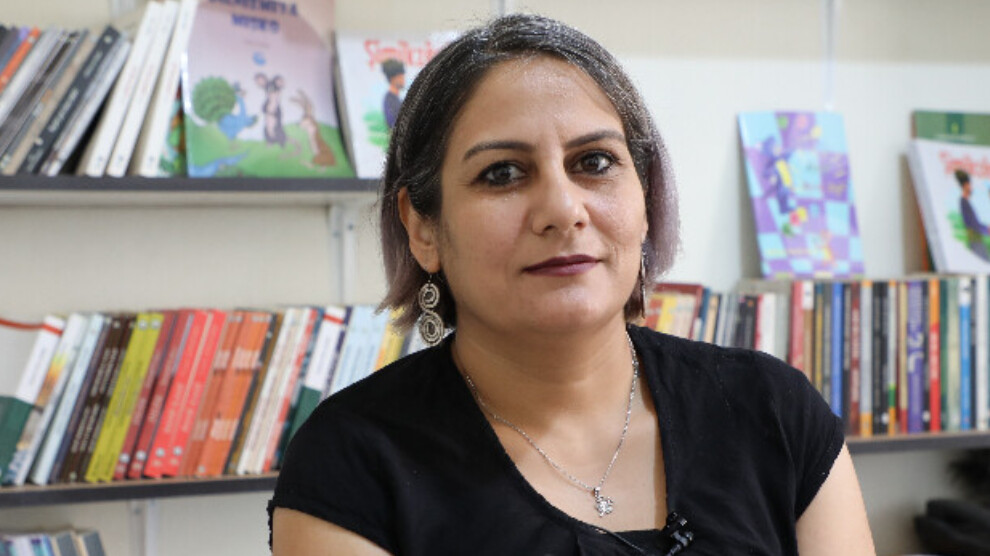Nerîman Evdikê: We need more literary critics
Nerîman Evdikê said that books written in Kurdish still face many difficulties, when it comes to go outside of Rojava.
Nerîman Evdikê said that books written in Kurdish still face many difficulties, when it comes to go outside of Rojava.

In the second part of this interview, Nerîman Evdikê, spokesperson of the Northern and Eastern Syria Literature Council, said that the region needs more literary critics.
The first part of this interview can be read here.
The main problem is the absence of critics
Nerîman Evdikê said that one of the main problems in Rojava is the lack of strong literary critics who can evaluate Kurdish works and added: "One of our main problems is the lack of literary criticism. There is no evaluating or analyzing the new books.
Kurdish is more disadvantaged
Literary books are published in Arabic and Kurdish languages in Rojava. Those who write in Arabic find different opportunities for themselves, but those who write in Kurdish do not have such an opportunity. Those who write in Arabic publish in Rojava, but if they wish, they can send it to an Arab state and publish it there. Even if they do not publish their work as a book, they can send their book to many literary critics and get their opinions. Sometimes articles are written about these books. In this case, that book not only gets the opportunity to be promoted, but also the author sees how to do it better through opinions and evaluations. Those who write in Kurdish do not have such an opportunity. I am one of them. I know that very well. The books I publish will remain in a certain environment. We do not have a critic to evaluate and promote Kurdish books.
Reading committees were established
For this reason, we, as the Literature Council, have established reading committees for several years. Before a book is published, reading committees meet and read it. Since we were new at the beginning of the revolution, and we had a Kurdish publishing house for the first time, we were publishing all the books we received without evaluating whether they were good or bad. This was actually a very wrong approach, and we suffer from it to this day.
We cannot go outside Rojava
And we are under siege. Our books are not translated into different languages. They are not invited to book fairs and festivals, and even if they are, writers are not invited due to the siege. This causes books to remain within their own borders. Today, I am both a writer and responsible for a publishing institution. I don't have the opportunity to go abroad, attend a fair or receive criticism from critics. In such a case, a person can only make different innovations by researching for a long time and gaining experience over the years. We also need to raise strong literary critics. Our books are not accepted at Silêmanî and Hewlêr book fairs because all the books there are written in the Soranî dialect. In Rojava, we write in Kurmanji. Actually, let's not say that it is not accepted. Because we were asked for books from there too, but the topics they wanted were a little different. For example, many books on religion and history are requested. Books written in Arabic are more requested. Books written in Kurmanji dialect are not requested much. There is interest in the books published here, both from writers in Bakur and from writers in Europe, but unfortunately, we have a problem delivering them to them."
Training young writers
The Literature Council organized a literature workshop for young women last year, said Nerîman Evdikê, adding: "This workshop developed after giving lectures for a year. Women were given academic lessons on stories, fairy tales, poetry, novels, articles and theatre. As a second stage, we arranged for female writers to meet with these young women, thus creating a dialogue between the old generation and the new generation, enabling the young to benefit from the experiences of the old and the old to empathize with the young. Older female writers read their books to these young people and shared their experiences. Again, young people shared their texts with them and received their opinions. Now we want to make a book from the texts written by this group of young women.
We also have a book club. We meet three times a month. The book to be read first is determined together. Then this book is distributed to everyone. After everyone has read it, a day is determined, and they gather together to discuss the book. We always invite young people to this book club. Many young people have written books in the last 10 years. We also discuss their books here. Experienced writers also come during the reading and evaluation of the book. In this way, the opinions of both young people and old people are taken into consideration, and the author expresses what he/she aimed to do when writing this book. In fact, we include young people in all our work and actions. They have a gift within themselves, and we need to reveal this gift."